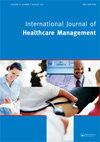Association of Home Falls and Accidents Screening Tool (HOME FAST) with risk of fall in older adults: Ardakan Cohort Study on Ageing (ACSA)
IF 1.1
Q4 HEALTH POLICY & SERVICES
International Journal of Healthcare Management
Pub Date : 2023-10-10
DOI:10.1080/20479700.2023.2265691
引用次数: 0
Abstract
ABSTRACTIntroduction Falls are a significant threat to older adults' health. The home falls and accidents screening tool (HOME FAST) was introduced as a screening tool for identifying hazards inside the home. This study aimed to investigate the ability of this tool to predict older adults at risk of falls.Materials and methods This study analyzed cross-sectional data from the Ardakan Cohort Study on Aging (ACSA) participants. HOME FAST was collected through home visits by interviewers. Fall history during the last 12 months was collected as a self-report. The discrimination was assessed by the receiver operating characteristic curve.Results A total of 4990 adults older than 50 participated in the current study, of which 47.65% were female, and the mean age was 61.5. Among them, 19.9% reported falls during the last year. The mean HOME FAST score was 6.2 for non-fallers, 6.5 for one-time fallers, and 6.4 for multipletime fallers (P = 0.047). The HOME FAST score over the optimal cut-point (five) was not associated with increased fall risk in the multivariate model.Conclusion Based on the findings, the HOME FAST score failed to be a screening tool for falls in the Iranian population. However, further prospective studies are required to investigate this point.KEYWORDS: HOME FASTaccidental fallsolder adultsgeriatricsfalling Disclosure statementNo potential conflict of interest was reported by the author(s).Additional informationFundingThe Iranian Ministry of Health and Medical Education has contributed to the funding used in the PERSIAN cohorts through grant number 700/151. Furthermore, this work was supported and funded by the University of Social Welfare and Rehabilitation Sciences.Notes on contributorsAhmad DelbariAhmed Delbari, an associate professor of gerontology, obtained his medical doctorate and subsequently completed a PhD in Clinical Geriatrics and Neuroscience at Karolinska University. Presently, he serves as the head of the Iranian Research Center on Aging and the Department of Aging at the University of Social Welfare and Rehabilitation Sciences, with over 20 years of experience in the field of geriatrics.Amirali AzimiAmirali Azimi is a medical doctor currently pursuing his postdoctoral research. His primary research interests lie in the field of orthopedics and musculoskeletal disorders, with a specific focus on orthogeriatrics. His recent research has predominantly revolved around osteoarthritis and falls, aiming to prevent subsequent complications such as fractures. He has also been actively involved in research related to post-surgical pain management, particularly in orthopedic procedures like joint arthroplasties.Mohammad SaatchiMohammad Saatchi is an assistant professor of epidemiology at the University of Social Welfare and Rehabilitation Science in Tehran. His recently published articles were about social trust, vaccine hesitancy, barriers to vaccination, air pollution, and telerehabilitation.Mohammad BidkhoriMohammad Bidkhori a Ph.D. candidate in epidemiology, conducts research in the field of public health, with a particular focus on older adults. His latest article is "Evaluation of Sleep Quality and Related Factors in Community-Dwelling Adults: Ardakan Cohort Study on Aging (ACSA).Fatemeh-sadat TabatabaeiFatemeh Sadat Tabatabaei is a medical doctor. The primary focus of this researcher's work and publications is in the fields of oncology and neurology. As a postdoctoral researcher at the Iranian Research Center on Aging, she primarily engages in research related to chronic diseases in older adults, such as malignancies, cognitive disorders, and neurological disease complications in this populationVahid RashediDr Vahid Rashedi is an Assistant Professor at the University of Social Welfare and Rehabilitation Sciences in Tehran, Iran. He holds a Ph.D. in Gerontology, which he earned with honors in 2017, as well as Bachelor's and Master's degrees in Rehabilitation Sciences. Dr. Rashedi is a member of both the Gerontological Society of America (GSA) and the American Psychological Association (APA). His research interests include Gerontology, Mental Health, and Cognition. Since 2019, Dr. Rashedi has served as a Global Burden of Disease (GBD) Collaborator with the Institute for Health Metrics Evaluation (IHME) at the University of Washington in the United States.Elham HooshmandElham Hooshmand is an MSc in epidemiology and PhD candidate in gerontology. She is the executive supervisor of the Ardakan cohort study on aging.家中跌倒和事故筛查工具(Home FAST)与老年人跌倒风险的关系:阿达坎老龄化队列研究(ACSA)
摘要:跌倒是老年人健康的一大威胁。家庭跌倒和事故筛查工具(home FAST)被引入,作为识别家庭内部危险的筛查工具。本研究旨在调查该工具预测老年人跌倒风险的能力。材料和方法本研究分析了来自Ardakan队列衰老研究(ACSA)参与者的横断面数据。HOME FAST是通过采访者家访收集的。收集过去12个月的秋季历史作为自我报告。用受试者工作特征曲线评价鉴别性。结果共有4990名50岁以上成年人参与本研究,其中女性占47.65%,平均年龄为61.5岁。其中,去年下降的占19.9%。未跌倒者的平均HOME FAST评分为6.2分,一次跌倒者为6.5分,多次跌倒者为6.4分(P = 0.047)。在多变量模型中,HOME FAST评分超过最佳切点(5分)与跌倒风险增加无关。根据研究结果,HOME FAST评分不能作为伊朗人口跌倒的筛查工具。然而,需要进一步的前瞻性研究来调查这一点。关键词:家庭快速意外跌倒成人老年人跌倒披露声明作者未报告潜在的利益冲突。伊朗卫生和医学教育部通过第700/151号赠款为波斯队列提供了资金。此外,这项工作得到了社会福利和康复科学大学的支持和资助。ahmed Delbari,老年学副教授,获得医学博士学位,随后在卡罗林斯卡大学完成临床老年病学和神经科学博士学位。目前,他是伊朗老龄化研究中心和社会福利与康复科学大学老龄化系的负责人,在老年病学领域拥有20多年的经验。Amirali Azimi是一名医学博士,目前正在进行博士后研究。他的主要研究兴趣在于骨科和肌肉骨骼疾病领域,特别关注矫形老年病学。他最近的研究主要围绕骨关节炎和跌倒,旨在预防骨折等并发症。他还积极参与与术后疼痛管理相关的研究,特别是在关节置换术等骨科手术中。穆罕默德·萨奇(Mohammad Saatchi)是德黑兰社会福利与康复科学大学流行病学助理教授。他最近发表的文章涉及社会信任、疫苗犹豫、疫苗接种障碍、空气污染和远程康复。Mohammad Bidkhori是流行病学博士候选人,在公共卫生领域进行研究,特别关注老年人。他的最新文章是“社区居住成年人睡眠质量及其相关因素的评估:衰老的Ardakan队列研究(ACSA)”。Sadat Tabatabaei是一位医生。该研究人员的工作和出版物主要集中在肿瘤学和神经学领域。作为伊朗老龄研究中心的博士后研究员,她主要从事与老年人慢性疾病相关的研究,如恶性肿瘤、认知障碍和该人群的神经系统疾病并发症。她是伊朗德黑兰社会福利和康复科学大学的助理教授。他拥有老年学博士学位,并于2017年以优异成绩获得该学位,以及康复科学学士和硕士学位。Rashedi博士是美国老年学学会(GSA)和美国心理学会(APA)的成员。主要研究方向为老年学、心理健康、认知学。自2019年以来,Rashedi博士一直担任美国华盛顿大学卫生计量评估研究所(IHME)的全球疾病负担(GBD)合作者。Elham Hooshmand是流行病学硕士和老年学博士候选人。她是阿达坎衰老队列研究的执行主管。
本文章由计算机程序翻译,如有差异,请以英文原文为准。
求助全文
约1分钟内获得全文
求助全文
来源期刊

International Journal of Healthcare Management
HEALTH POLICY & SERVICES-
CiteScore
5.40
自引率
9.50%
发文量
77
 求助内容:
求助内容: 应助结果提醒方式:
应助结果提醒方式:


